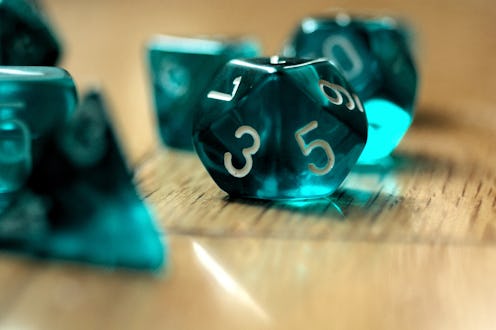Life
4 Women Explain How They Got Really, Really Into Role-Playing Games In Lockdown

Whether it's the power of Stranger Things or just heavy '80s nostalgia, role-playing tabletop games like Dungeons & Dragons (D&D) are having a moment. The isolation of the coronavirus pandemic, which has kept billions of people in their homes, has only made them more popular. Women tell Bustle that they've found playing RPGs like Dungeons & Dragons during the pandemic lockdown to be a source of joy, stress release, empowerment, and community.
Games like D&D that can be played remotely, with just an internet connection and a set of dice, have boomed during global COVID-19 lockdowns. Wizards of the Coast, the makers of D&D, Magic: The Gathering, and other RPGs, tell Bustle that the pandemic pushed them to place many of their resources online, often for free, so that people could learn to play at home. "Our partner D&D Beyond [an online D&D resource] has seen a 50% increase in new account registrations month over month this year," they say. Their partner Fantasy Grounds, a virtual space for people to play licensed tabletop games, also reported three times as many game sessions in April 2020 compared to April 2019. And female players, both veterans and newbies, tell Bustle it's not surprising.
"As someone who has had the remarkable ill luck to have caught COVID-19, I've spent much of lockdown also in quarantine, in bed," Rebecca, 33, tells Bustle. "But in my D&D game, my character has hugged, laughed, cried, drunk, and done some serious hiking with my friends. The fact that we can suspend reality for a few hours and go somewhere else, full of fresh air and mountains and mysterious castles, is incredibly soothing." She also loves the fact that D&D allows her to fight for justice, particularly when her own government is stumbling through crisis after crisis in the real world.
It's helped her feel capable of solving problems, too. "In the real world we've fixed Zoom connections, couriered webcams to people without them, and ironed out the rules around how Sneak Attack actually works. Together," Rebecca says. "That's good for the soul, especially when everything is feeling insoluble, and too big for us to handle."
The fact that we can suspend reality for a few hours and go somewhere else, full of fresh air and mountains and mysterious castles, is incredibly soothing.
The social element of RPGs has helped keep some players connected. "Initially, I think Quaran-D&D was a way to connect with friends who are far away — to recapture the atmosphere when some of your favorite people are all together, hanging out and being ridiculous," Sophie, 33, tells Bustle. "I grew to completely love the quick-thinking, mistake-making, oh-sh*t-thin-ice unsteadiness of it." She likes that it constantly challenges her to explore new aspects of gameplay, which fuels her creativity.
Tove, in her 40s, a long-time player of RPGs, finds their escapism empowering. "D&D has most certainly helped me during the pandemic, in more than one way. It’s an alternative world to escape to when the news and death statistics are getting too grim," she tells Bustle. The current popularity of RPGs is also helping Tove pay the bills during lockdown; she and her partner run a micro-publishing company called Midnight Tower and publish their adventures online. They've been able to make it their full-time occupation since January, in no small part due to a swell in interest during the pandemic. "I'm currently engrossed in drawing dragons for the next adventures," she says.
For Sarah, 33, the role-playing is soothing. "There is something deeply special and healing about being someone else, an idealized version of yourself even, for a few hours in a world and situation unaffected by the virus," she tells Bustle. "There is no problem you can't take an action to solve, no place you cannot go, so long as you are determined."
Sarah has found it's made her feel less alone. "Your character can interact, feel, hug and explore with your friends' characters, which, while no substitute for real life, is a recognizable BandAid," she says. "But I guess when you get down to the heart of the matter, it's just nice to talk to friends about something else for a while."
For Rebecca, the greatest thing about RPGs have been their hopefulness. "If our D&D games have shown me anything, it's that problems don't have to be solved by politicians: they can be solved by people, if we're prepared to work hard enough, long enough, and together," she says. "That gives me hope and nothing, right now, is as good for my mental health as hope."
This article was originally published on